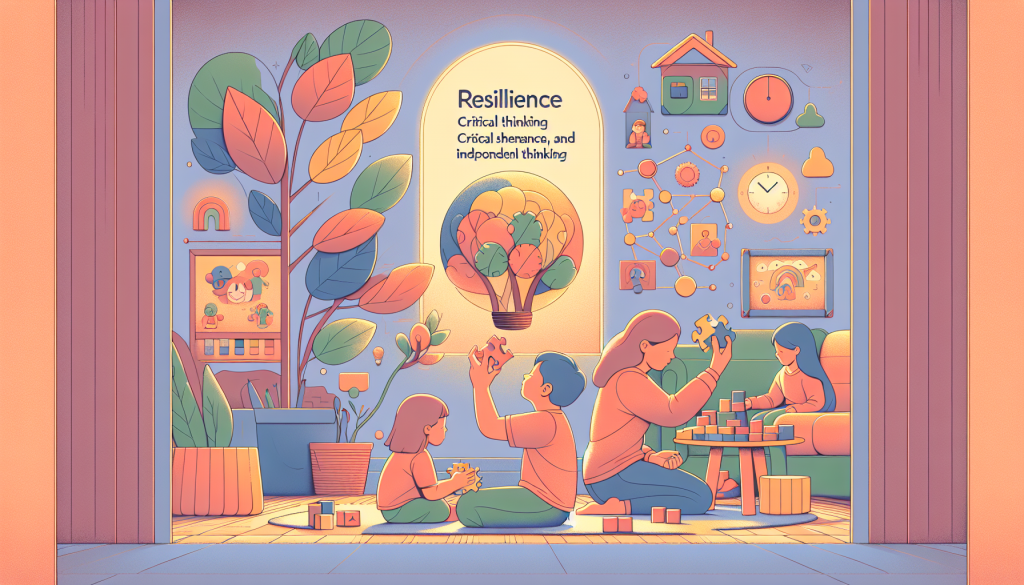“`html
Encouraging Problem-Solving Skills in Children
As parents, one of the most valuable gifts we can give our children is the ability to solve problems effectively. Problem-solving skills are essential for child development, as they empower kids to navigate challenges, make decisions, and build resilience in the face of adversity. But how can we, as caregivers, nurture these skills in a way that feels natural and supportive?
Why Problem-Solving Skills Matter
In today’s fast-paced world, having strong problem-solving skills is more important than ever. These abilities not only prepare children for academic success but also enhance their emotional well-being. According to the principles of cognitive-behavioral therapy (CBT), problem-solving fosters a sense of autonomy, increases self-confidence, and fulfills a child’s psychological need for safety and self-expression.
For instance, imagine a child struggling to complete a school project. Without problem-solving skills, they may feel overwhelmed, leading to frustration or even avoidance. However, a child equipped with these abilities can break the task into smaller steps, seek help when needed, and persevere until the project is complete.
How Problem-Solving Contributes to Child Development
- Boosts Resilience: Children who learn to solve problems are better equipped to handle setbacks and challenges.
- Encourages Critical Thinking: Problem-solving skills help kids analyze situations and make informed decisions.
- Improves Relationships: Navigating conflicts and finding solutions enhance social skills and empathy.
By fostering these abilities early on, parents can set their children up for a lifetime of success and satisfaction.
Strategies for Encouraging Problem-Solving Skills
So, how can you help your child develop strong problem-solving skills? Here are some effective parenting strategies to consider:
1. Create a Safe and Supportive Environment
Children thrive when they feel safe and supported. Make sure your child knows that it’s okay to make mistakes and that they can always come to you for guidance. For example, if your child spills juice on the floor, instead of scolding them, encourage them to think of ways to clean it up.
2. Encourage Independent Thinking
Give your child opportunities to make decisions and solve problems on their own. For younger kids, this could mean choosing their outfit for the day. For older children, it could involve figuring out how to save for a desired toy.
3. Teach Problem-Solving Steps
Break down the problem-solving process into manageable steps:
- Identify the problem.
- Think of possible solutions.
- Evaluate the pros and cons of each solution.
- Choose the best solution and act on it.
- Reflect on the outcome and learn from the experience.
Model these steps in your own life as well. When your child sees you approach problems methodically, they’re more likely to adopt the same approach.
4. Ask Open-Ended Questions
Instead of giving your child all the answers, ask open-ended questions that encourage critical thinking. For example:
- “What do you think we should do in this situation?”
- “How could we make this easier?”
- “What might happen if we try this?”
This approach not only helps children develop their problem-solving skills but also shows that you value their input and ideas.
5. Use Games and Activities
Games and activities are a fun and effective way to teach problem-solving. Puzzles, board games, and role-playing scenarios can all help children practice thinking critically and finding solutions. For instance, playing a game like chess can teach strategic thinking, while building a LEGO structure encourages creativity and perseverance.
Practical Tips for Parents
Ready to put these strategies into action? Here are some additional tips to keep in mind:
- Be Patient: Developing problem-solving skills takes time. Celebrate small victories and encourage your child to keep trying.
- Offer Positive Reinforcement: Praise your child when they come up with a solution, even if it’s not perfect.
- Encourage Collaboration: Teach your child to work with others to solve problems, whether it’s with siblings, friends, or classmates.
- Model Problem-Solving: Share your own problem-solving experiences with your child, showing them how you approach challenges.
Conclusion
Encouraging problem-solving skills in children is one of the most impactful ways you can support their development and set them up for success. By creating a safe environment, fostering independence, and teaching practical strategies, you can help your child build confidence, resilience, and critical thinking skills.
Remember, every child is unique, and there’s no one-size-fits-all approach to parenting strategies. Be patient, stay consistent, and celebrate your child’s progress along the way. Together, you can navigate life’s challenges with confidence and creativity.
For more resources on parenting and child development, check out our articles.
“`

